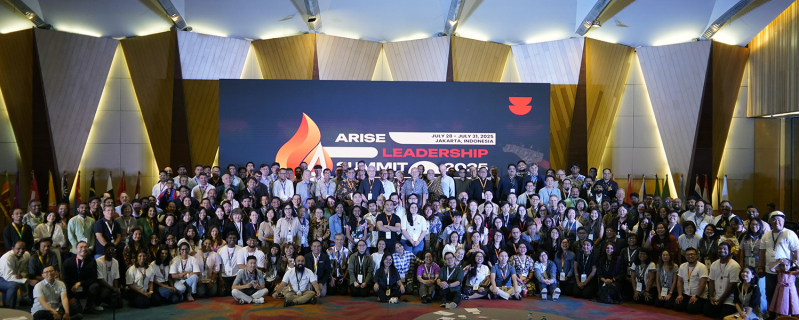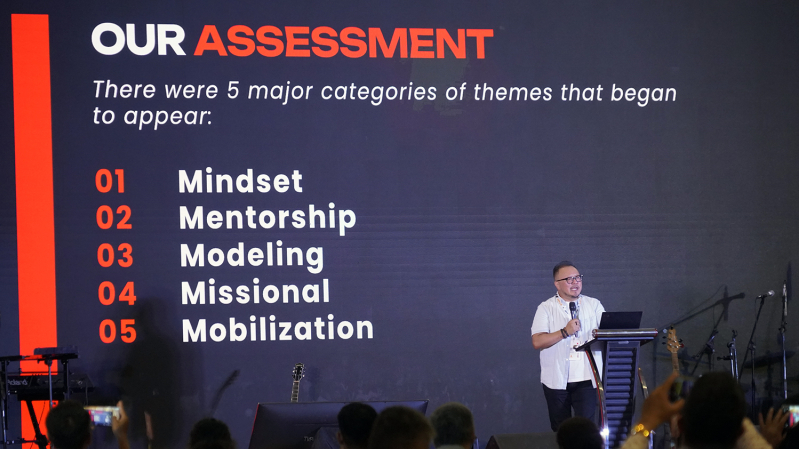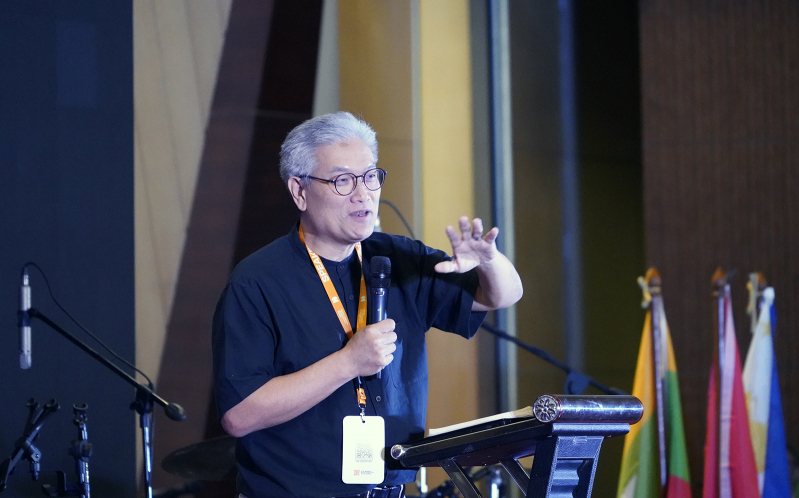
The Arise Leadership Summit 2025 concluded on Thursday, July 31, with a detailed presentation of participant-generated insights and a clear call for continued collaboration to mobilize the next generation of mission leaders across Asia.
The four-day gathering, hosted in Jakarta, Indonesia, brought together nearly 300 participants from 22 countries to reflect, strategize, and pray about the future of missions in their respective contexts.
Rev. Seth Kim, co-founder and Vice President of Arise Asia, delivered the main presentation during the final session, summarizing the results of the open space conversations and breakout groups that had taken place earlier in the week. The findings were framed as a “living document”—not final, but already indicative of the movement’s core values and collective direction.
Rev. Dr. David Ro, Executive Director and co-founder of Arise Asia, followed with closing remarks, emphasizing that the summit’s conclusions marked not an endpoint, but the beginning of a new season for the Arise movement. He invited national leaders and local movements to actively prepare for the next major event: the Arise Asia 2026 Congress to be held in Bangkok, Thailand.
Collaborative process yields five key themes
During his address, Kim described the data synthesis process the Arise team used. Participant feedback had been collected through World Café sessions and open space group conversations. The data was then aggregated using AI tools and reviewed by a human team to ensure accuracy and thematic integrity.
“This is not the final word,” Kim said. “It is a working document that reflects what we have heard. More revisions will follow as we continue to listen to your input and the guidance of the Holy Spirit.”

The synthesis led to five overarching themes: Mindset, Mentorship, Modeling, Missional Living, and Mobilization—referred to collectively as the “Five M’s.”
Each category, Kim said, represents a necessary component of a healthy mission ecosystem rooted in biblical principles and contextual realities.
Mindset: Transforming the way we think about missions
The first theme addressed the need to reshape prevailing attitudes about what constitutes mission work and who is called to participate. Drawing from Romans 12:2, Kim emphasized the importance of renewing one’s mind and moving beyond outdated or overly narrow definitions of missions.
He cautioned against two extremes: viewing missions solely as cross-cultural, full-time sending, or diluting the term so much that any Christian activity is considered missional.
“If everything is mission, then nothing is mission,” Kim said, quoting Scottish missiologist Stephen Neill. “We must retain a focused commitment to unreached people groups while affirming that God calls all believers to participate in His mission.”
Participants frequently highlighted the need for better theological education and awareness in churches to help members understand both the biblical basis for missions and the urgency of global gospel work.
A participant wrote in their response: “We must begin with our mindset. But who can truly change it? Only God can transform our minds. Therefore, we must partner with Him in helping others grasp His global purpose.”
Mentorship: Passing the baton with intentionality
The second theme, mentorship, emerged consistently throughout the summit’s discussions. Participants from both younger and older generations emphasized the importance of relational, intergenerational discipleship as a primary means of leadership development.
Kim encouraged older leaders to take initiative in mentoring and younger leaders to seek out guidance persistently. Referencing 2 Timothy 2:2, he called for a multi-generational chain of discipleship.
“Mentorship must be intentional and relational,” he said. “It’s not about programs. It’s about people walking together through life, learning by example.”
One participant noted, “Gen Zs are not the objects; they are the subjects. It’s not about us raising them to be missional, but about them rising to be the mission force God wants them to be.”
Another remarked, “Get them passionate about the beauty of God’s redemptive plan, and they will come. But first, they must see it in our lives.”
Kim urged leaders to invest time not only in public teaching but also in personal modeling and private conversations that shape emerging leaders.
Modeling: Christlike leadership across generations
The third theme, modeling, referred to the role of seasoned leaders in setting examples of integrity, humility, and faithfulness. Kim noted that many participants had spoken candidly about “church hurt” and disillusionment with leadership. These stories pointed to the importance of character formation in leadership, not just ministry skills.
Referencing 1 Corinthians 11:1—“Follow my example, as I follow the example of Christ”—Kim challenged leaders to live lives worthy of imitation.
Younger participants expressed a desire for mentors who not only teach but embody the gospel in family life, work, and community engagement.
“If we really want young people to go,” one submission stated, “they must see our lives full of prayer, love, and service.”
Modeling also includes spiritual parenting. Several participants emphasized the need for spiritual fathers and mothers, especially in cultures marked by fractured family structures.
“We need godly families and homes,” Kim said. “And when those are missing, the Church must step in to model what it means to follow Christ in community.”
Missional living: A commitment to the Great Commission
The fourth theme, missional living, centered on how Christians can integrate the Great Commission into their everyday lives. Participants agreed that both local and cross-cultural expressions of mission are necessary.
Kim referenced Matthew 28:19–20 and emphasized that the command to “make disciples of all nations” requires proactive engagement in various settings—churches, schools, workplaces, and online platforms.
He encouraged participants to think beyond traditional ministry models and consider new opportunities for gospel engagement, particularly in digital spaces.
“Some of the most effective evangelism today is happening on TikTok and other social media platforms,” Kim said. “We need to equip young people to be salt and light in those arenas.”
One participant shared, “Sending is a whole church, whole community activity. You need parents raising children who are supported to follow their mission calling. You need entrepreneurs who will fund missions. You need church structures to equip and sustain it.”
Kim affirmed this ecosystem approach as essential to sustaining long-term mission impact.
Mobilization: Turning inspiration into action
The final theme, mobilization, focused on how the summit’s inspiration could be translated into practical next steps. Kim acknowledged a common challenge with conferences: the emotional and spiritual momentum often fades after participants return home.
He shared his own experience as a college student whose life was changed by a short-term mission trip to Africa. “We didn’t do anything extraordinary,” he said, “but it awakened something in me that’s still burning today.”
Kim emphasized the importance of follow-up, short-term exposure, and mobilizing local and global teams. He proposed that each national Arise movement aim to send one local and one international team in the coming year.
“Events matter,” he said, “but movements are sustained by next steps.”
Participants were encouraged to think practically—mobilizing through prayer, training, internships, and church involvement.
“The harvest is plentiful, but the laborers are few,” Kim reminded the audience, quoting Matthew 9. “We must pray, prepare, and send.”
Ro: “We are just one small part of God’s greater mission”
In his final address, Rev. Dr. David Ro affirmed the findings and thanked Kim and the Arise team for their synthesis work. He also acknowledged the tension leaders feel in balancing vision, faith, and logistical realities.
Quoting Psalm 112, Ro emphasized that joy and stability come from trusting in God—even in seasons of uncertainty. He shared openly about his own internal wrestling with concerns for the future, noting that leadership often involves navigating both faith and fear.

“This week reminded me that this is not my movement,” Ro said. “It belongs to God. And we trust Him with what comes next.”
Ro reinforced that Arise Asia is not a centralized organization or solution, but a platform for collaboration. “We are just one small part of the global body of Christ,” he said. “Our job is to play our part faithfully.”
Intergenerational unity: Praying together and passing the baton
One of the summit’s most moving moments occurred the night before when older participants prayed over the younger generation, laying hands on them and speaking words of encouragement. The younger participants then returned the blessing, praying for their elders in a symbolic exchange of honor and shared purpose.
The interaction captured the spirit of the week, which repeatedly emphasized the need for both generations to walk together.
“I’m thankful that the older generation said, ‘It’s your turn to take the baton and run,’” one Gen Z participant said. “But it was even more meaningful when someone told me, ‘You don’t just get a seat at the table—you get a choice in the kitchen.’”
Another participant, reflecting on the conference dynamic, admitted, “At first, it felt like we were being analyzed like a species. But then I saw how much the older generation really wants to understand and support us. It made me want to do the same for those coming after me.”
A 19-year-old attendee, likely the youngest participant, said, “Sometimes I feel misunderstood by older generations. But I also see that their hearts are in the right place. And I want people to remember—Gen Z isn’t a stereotype. We’re not all the same.”
Looking ahead to Arise Asia 2026
Looking ahead, Kim and Ro emphasized that the Arise Asia 2026 Congress in Bangkok will serve as a key milestone in the broader journey of mobilizing the next generation.
Rather than being a stand-alone event, the congress is envisioned as a continuation of the movement’s long-term priorities: raising mission-minded young leaders, strengthening intergenerational partnerships, and building sustainable, locally rooted mission ecosystems across Asia.
Ro underscored that the upcoming gathering must be anchored in grassroots discipleship and collective ownership by national movements. “This is not a Western-funded initiative,” he said. “If we are truly a mission-sending region, we must build the infrastructure and take ownership of our vision.”
He noted that many national leaders are already planning to send both local and global mission teams in the lead-up to 2026, and emphasized the need for coordinated efforts between churches, mission agencies, and local movements to prepare young people for long-term engagement.
“This summit was not a conclusion,” Ro said. “It was a commissioning.”





